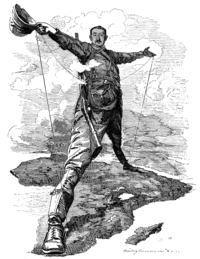British South Africa Company

The British South Africa Company (BSAC) was established by Cecil Rhodes through the amalgamation of the Central Search Association and the Exploring Company Ltd., receiving a royal charter in 1889. Modelling the BSAC on the British East India Company, Rhodes hoped it would enable colonisation and economic exploitation across much of south-central Africa, as part of the "Scramble for Africa". The company's directors included the Duke of Abercorn, Rhodes himself and the financier Alfred Beit.

Powerful company
Trading
The company was empowered to trade with African rulers such as King Lobengula; to form banks; to own, manage and grant or distribute land, and to raise a police force (the British South Africa Police). In return, the company agreed to develop the territory it controlled; to respect existing African laws; to allow free trade within its territory and to respect all religions. But Rhodes and the white settlers who made up the company were known best for setting their sights for ever more mineral rights and more territorial consessions from the African peoples, establishing their own governments, making their own laws little concern or respect for African law, and flexing their muscles with their artillery.
Security
The company recruited its own army, and attacked and defeated the Matabele and Shona north of the Limpopo river in what became known as the First Matabele War. It was the first time in history Britons have used the Maxim gun in combat (five Maxims to five thousand Ndebele casualties). The company carved out (and for the following three decades administered) a territory which it named Zambezia, and later, Rhodesia, and which now covers the area occupied by the republics of Zambia and Zimbabwe.
Politics
In 1914, the royal charter was renewed, on condition that settlers in Rhodesia were given increased political rights. In 1922, the company entered negotiations with the government of the Union of South Africa, which was keen to take over the territory - a plan foiled by the colony's settlers, who voted against incorporation with South Africa. In 1923, Britain chose not to renew the BSA Co's charter, and instead accorded 'self-governing' colony status to Southern Rhodesia (today, Zimbabwe) and protectorate status to Northern Rhodesia (today, Zambia).
Profits
The BSAC was not able to generate enough profit to pay its shareholders dividends until after it lost direct administrative control over Rhodesia in 1923. In 1933, the BSAC sold its mineral exploration rights south of the Zambezi to the Southern Rhodesian government, but retained rights over Northern Rhodesian mineral rights, as well as the company's vast interests in mining, railways, real estate and agriculture across southern Africa.
Merger
In 1964, the company was forced to hand over its mineral rights to the government of Zambia, and the following year, the British South Africa Company merged with the Central Mining & Investment Corporation Ltd and The Consolidated Mines Selection Company Ltd to form a mining and industrial company known as Charter Consolidated Ltd, of which slightly over one-third of the shares were owned by the British/South African mining company Anglo American plc.
References
- Rasmussen, R. K., & Rubert, S. C., 1990. A Historical Dictionary of Zimbabwe, Scarecrow Press, Inc., Metuchen, NJ, United States of America.
- Scouting on Two Continents, by Major Frederick Russell Burnham, D.S.O. LC call number: DT775 .B8 1926. (1926)
